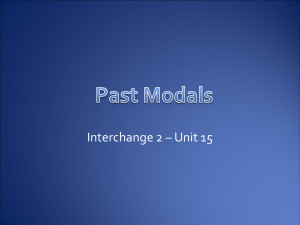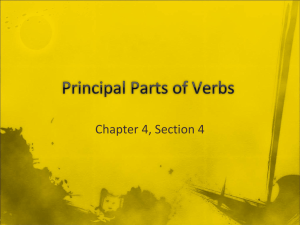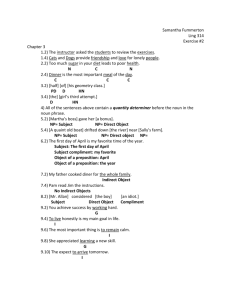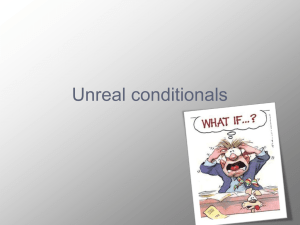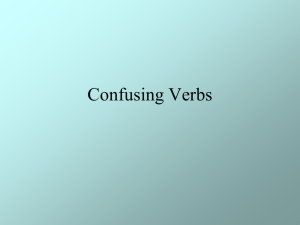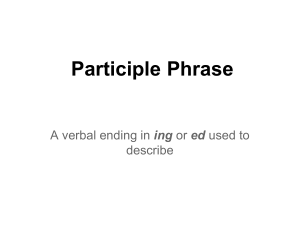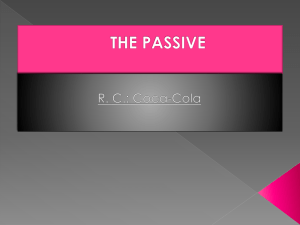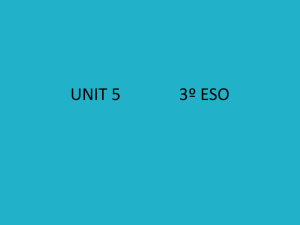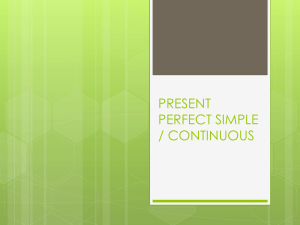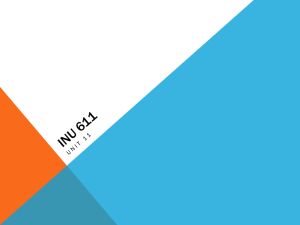Grammar Review Intermediate
advertisement
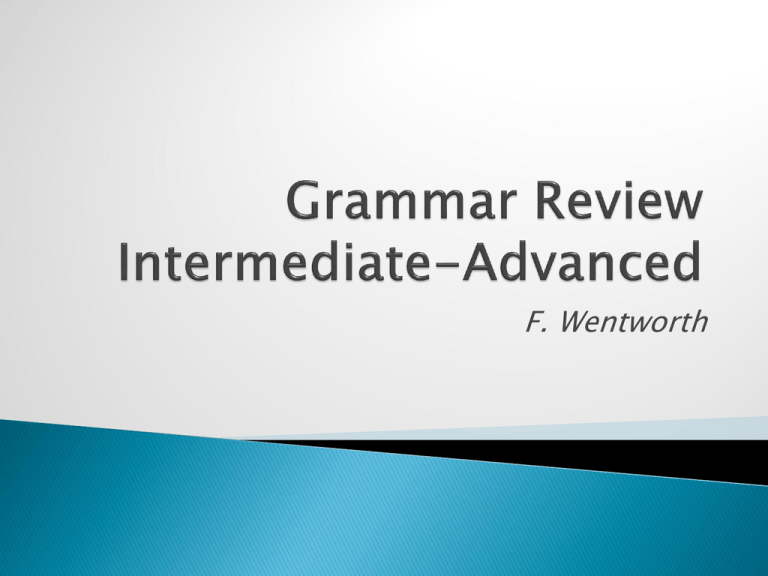
F. Wentworth Do the following three exercises: (click on the exercise. Exercise 1 Exercise 2 Exercise 3 Use the Past Progressive to talk about an action that was going on in the past: Usually used when talking about two actions. Two things going on at the same time: I was watching TV while I was eating dinner. Or: Something that was going on that was interrupted by another action. The second action is in the simple past. I was eating dinner when the phone rang. I He She It You We They was was was was +__________ ing + __________ing + __________ing + __________ing were +__________ing were +__________ing were +__________ing Click here for the exercise Use the simple past for things that are finished in the past. Usually there will be a specific time word that makes it past like: yesterday, last night, two weeks ago, last year, in 2006, last September, at 12:00 PM, etc. You can not use present perfect with these time words. For example: I went to the beach last Sunday. (Not I have gone to the beach…) Present perfect is for actions or states of being that begin in the past but are still going on in the present, or actions that happened in the past but have been repeated and have the possibility of repeating in the future. Time words are not specific: Present Perfect often uses time expressions like: Already/yet Many times For/since Just I have already seen that movie. I saw it two weeks ago. I have been here for 6 months. I arrived 6 months ago. I have been here since 2006. I came here in 2006. I have just had lunch. I had lunch at 12:00. Exercise Use the past perfect when talking about things in the past that happened before another thing in the past. For example: (1) (2) I had already eaten when John came by to visit. The first thing that happened is in past perfect. The second is in the past. I You He She It You We They Had + Past Participle ** The past participle is the third column on your verb lists.** **For regular verbs it is the same as the past tense.** I had studied English for two years before I came to the United States. After I had eaten lunch, I washed the dishes. **In speaking people often don’t use the past perfect so you will hear people say: “After I ate lunch I washed the dishes.** Exercise Use Passive Voice when the ‘doer’ (the one performing the action or the subject) is not known or not important. For example: That building was built in 1876. What is more important is the building and when it was built, not who built it. We also may not know who built it. The fire was put out after many hours (by the firefighters). We assume that firefighters put out the fire, so it isn’t necessary to say “by the firefighters:). I You He She It You We They Was + past participle Was + past participle Was + past participle Was + past participle Was + past participle Were + past participle Were + past participle Were + past participle Exercise 1 Exercise 2 There are two kinds of conditionals: Real and Unreal. Real-means something will happen as long as a condition is met. If it is sunny tomorrow, we will go to the beach. When you use the word hope, it is a real condition. I hope it will be sunny tomorrow so we can go to the beach. . Unreal: This is something that will not happen or did not happen because it is not possible. If I were rich, I would travel around the world. The fact is, I am not rich, so I can’t travel around the world. When you use the word wish, it is unreal. I wish I were rich so that I could travel around the world Present: Used with if or when with the present tense in both clauses: If/When +present….present. If (When) it rains, we usually stay home and read. Sentences can begin with the if/when clause or the main clause. We usually stay home and read when (if) it rains. (no comma when you begin with the main clause) Using if suggests that it doesn’t happen frequently. When suggests that it is a usual occurrence. Future: Although you don’t really know what will happen in the future, you know that if a condition is met, something will happen. It describes what you think will happen. If, when +present……simple future When I have a day off, I will visit you. If it rains tomorrow, we will stay home and watch a movie. Past Real: The past real conditional describes what you used to do if a certain condition was met. When I was a child, my brothers and I often played outside. When I had a day off, I often went to see my grandmother. Use If/When + simple past…..simple past Present: Used to talk about what you would do in an imaginary situation. Use: If+ simple past….would+ verb (base form) (Do not use when in unreal conditionals) If I were rich, I would travel around the world. If I had a car, I would visit you more often. I would buy that computer if it were (was is often used in conversation here) cheaper. Using were in with I, he, she and it, is grammatically correct, however in conversation people often use was. Modals: Present unreal: You can use could or might. If she had time, she might go to the party. If she were bilingual, she could get a good job. Future: This is formed like the present unreal. If I had time, I would go to your party tomorrow. If you helped me move, I would buy you dinner. (The person isn’t going to help) Past: Use Past unreal conditional to talk about imaginary things in the past. If + past perfect…..would have + past participle If I had owned a car, I would have driven to work. If I had known you were sick, I would have called you. If she had had time, she would have helped you move. Modals: Could have Might have If she had lived in Spain, she could have learned Spanish. If she had had more money, she might have traveled more. (She never had enough money to travel) Present: If it were raining, we would stay home and watch a movie. Past: If it had been raining, we would have stayed home and watched a movie. Future: If we were waiting at the airport when he arrived, he would be very surprised. Exercise 1 Exercise 2 Exercise 3 Hope: Use with Real Conditional I hope it rains tomorrow I hope he will be able to visit next week. Wish: Use with Unreal. I wish I were rich. I wish I had more time I wish I could speak English fluently. I wish I had known you were coming. I would have made dinner for you. Exercise
